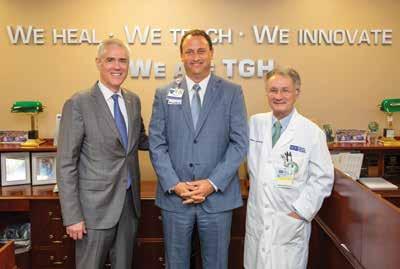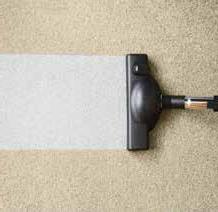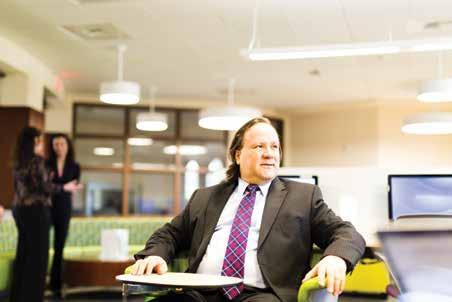
16 minute read
University
HONORS AND AWARDS USF leads the state in student success metrics
USF LED ALL STATE UNIVERSITIES in performance-based funding scores for 2020, according to data compiled by the Florida Board of Governors (BOG).
USF placed first in the state compared to other universities in a series of 10 student success-based metrics established by the BOG that focus on affordable access, graduating students at a high rate, with minimal debt, and preparing them for high-skilled, high-paying jobs in high-demand fields.
“The University of South Florida community should be immensely proud of our success in the state’s performance-based funding model. Our achievements are truly a reflection of the dedicated work of our students, faculty and staff,” USF President Steven Currall says. “Our performance on benchmarks such as graduation rates, student access and the number of students employed after earning a degree underscores my belief that USF is where academic excellence converges with opportunity for our students. Our performance-based funding milestones advance our goal of becoming a top 25 public university.”
USF earned the highest score in the state in the following categories, according to the BOG’s formula (includes ties): • Four-year graduation rate • Bachelor’s degrees awarded in areas of strategic emphasis • Graduate degrees awarded in areas of strategic emphasis • Percent of bachelor’s degrees without excess hours • Net tuition and fees per 120 credit hours
“Congratulations to the University of South Florida on achieving its highest performance-based funding score to date and top score for the State University System,” says Brian Lamb, ’98 and MBA’17, Life Member, vice chair of the Board of Governors and chair of its Budget and Finance Committee. “Thank you to the governor and the legislature for their unwavering support of the State University System. USF’s upward trajectory has been outstanding. This is a testament to the dedication of excellence from the students, faculty and leadership of the institution. I look forward to their continued success.”
USF has been a consistent leader in the state’s performance-based funding model, which takes into account the metrics of all three USF campuses, since the system was implemented in 2014.
“Leading all state universities in this year’s performance metrics is another example of how the University of South Florida’s focus on strategic goals can produce record-breaking results,” says USF Board of Trustees Chair Jordan Zimmerman ’80, Life Member.
UNIVERSITY NEWS New clinical affiliation will benefit patients across Tampa Bay region
TAMPA GENERAL HOSPITAL AND USF have formed a new clinical affiliation, a significant milestone that will further solidify one of the largest academic medical centers in Florida and build upon their longstanding relationship and commitment to improving health care in Tampa Bay.
The enhanced affiliation enables the two organizations to align administrative and clinical practice areas into a new organization, an effort mirrored across the country as most top-ranked medical schools and hospitals move toward integrated models that bolster academics, research and clinical care. TGH’s Board of Directors and the USF Board of Trustees previously approved the new organization.
The new USF and TGH focus means Tampa Bay’s best health care providers are well-positioned to deliver the cutting-edge care and innovative treatments that are a hallmark of academic medicine.
The new affiliation will benefit patients across Tampa Bay by enabling the region’s only academic medical center to provide seamless, comprehensive care for patients, according to John Couris, TGH president and CEO, and USF President Steven Currall. “TGH, USF and our private practice physicians have always had the most success when working together to improve health in Tampa Bay,” Couris says. “Now that we are more strategically aligned, we can create a powerhouse that delivers world-class health care on the west coast of Florida.”
TGH and USF have worked closely together for nearly 50 years, since the opening of the medical school in the early 1970s.
“Strengthening and expanding upon the affiliation between the University of South Florida and Tampa General Hospital presents extraordinary benefits and new opportunities for education, health care and research in the Tampa Bay region and beyond,” Currall says. “Our joint vision is to become one of the nation’s most outstanding academic medical centers.”
From left, USF President Steve Currall, TGH President John Couris, and Dr. Charles Lockwood, dean, USF Morsani College of Medicine and senior vice president of USF Health.
University
Ryan Noone | USF News

Above: Civil and Environmental Engineering Professor Daniel Yeh demonstrates the Organic Processor Assembly, a system that extracts nutrients from human waste.


Left: The first Artemis rocket stage is guided toward NASA’s Pegasus barge Jan. 8 ahead of its forthcoming journey to NASA’s Stennis Space Center near Bay St. Louis, Miss.
RESEARCH AND INNOVATION USF technology being tested for possible use on moon mission
A TECHNOLOGY CREATED AT USF is now at NASA’s Kennedy Space Center, where its effectiveness under simulated space mission conditions is being tested.
Civil and Environmental Engineering Professor Daniel Yeh has been collaborating with NASA to develop a system that converts human waste into fertilizer and water, which would allow astronauts to grow fresh vegetables in space in a more sustainable way. It could help enable the establishment of a permanent presence on the moon.
Yeh’s invention, the Organic Processor Assembly, is a closed system the size of a miniature fridge and automatically extracts nutrients directly from the toilet. It uses some of the same principles of his NEWGenerator resource recovery machine, which converts human waste into clean water, energy and fertilizer, and is currently being used in India and South Africa. “Over the years, our team has gotten pretty good at coming up with technologies that work well on Earth,” Yeh says. “Developing resource recovery solutions for space was something new. It presented a whole new series of design challenges to overcome, such as those related to mass, volume, modularity and reduced gravity.”
NASA’s lunar exploration program, Artemis, is working to return humans to the moon in 2024. NASA landed the first man on the moon with Apollo 11 in 1969, and Artemis is the first time a woman is set to land on the moon. It puts the agency one step closer to sending astronauts to Mars.
Over the last decade, there have been nearly 40 expeditions to the International Space Station, which is in orbit more than 250 miles above Earth, traveling faster than 17,000 mph. Comparatively, the moon is 238,900 miles away, making it far more difficult to restock supplies and nearly impossible to dump waste. Mars, which takes six to eight months to get to, will be even more challenging for resupply.
Building on previous experiments, astronauts aboard the International Space Station have grown small amounts of produce, such as lettuce, cabbage and kale, since 2014

through the Vegetable Production System, known as VEGGIE. The Organic Processor Assembly aims to eliminate the need to transport fertilizer, as it is created on-site. It facilitates growing fresh produce to supplement the astronauts’ diet on long duration missions, which is also great for psychological reasons, especially since living things can serve as a reminder of home.
“NASA can only resupply a limited mass and volume to the moon and Mars habitats. This limitation forces research advancements to provide a reliable, closed-loop system between food consumption and production,” says Luke Roberson, NASA’s principal investigator. “With the OPA technology, we’re investigating if we can sustainably begin recycling human wastewater resources into potable water and fertilizer nutrients. There is a big difference between a fresh and canned strawberry in both nutrient content and interaction with your senses.”
Earlier this year, Yeh, Roberson, USF graduate student Talon Bullard ’18 and former USF postdoc Melanie Pickett MEVE ’15, PhD ’18, -won the Kennedy Space Center’s 2020 Sustainable Environmental Awareness Award. A patent has also been issued and other patents are pending. So far, Yeh has received more than $340,000 in grant funding from NASA. This includes a seed grant awarded in 2018 that allowed Bullard to start developing a prototype for the Organic Processor Assembly.
NASA is expected to decide if the technology will be sent to the moon over the next two to three years. A second unit of the Organic Processor Assembly will remain at USF for further testing.
– ALTHEA PAUL | USF News
University
TAMPA BUSINESSMAN JOHN MCKIBBON made one key request in 2013 when he endowed the M3 Center for Hospi tality Technology and Innovation at USF’s Sarasota-Manatee campus.
He asked that it make an impact. Since then, the center has been doing just that, delivering cutting-edge research, hosting academic conferences and workshops globally, and disseminating the latest in hospitality-related advances through traditional and “open-access” journals and other publications.
“Mr. McKibbon is a visionary and he understands the importance of research and technology to the hospitality industry, which is why he wanted to establish the M3 Center as a global resource,” says Professor Cihan Cobanoglu, the center’s director and McKibbon Endowed Chair. “He said he wanted the M3 Center to impact as many people as possi ble.”
The center, named for the hospitality accounting- and analytics-software company founded by McKibbon, reaches close to 100,000 people annually through research papers, articles, journals, books, conferences, online presentations and hospitality software that is made available to more than 1,500 hospitality students worldwide each year.
“People in more than 180 countries are touched by the M3 Center’s products and services,” says Cobanoglu, who has served as the center’s director since its creation. “It’s remarkable when you look at the numbers and consider how many people around the world are affected by the center.”
Its Global Conference on Business and Economics last fall in Istanbul, Turkey, attracted researchers from more than 20 countries. Likewise, the center’s Global Conference on Education and Research last summer in Sarasota drew a sizeable international crowd. Thousands more tune in to its website and YouTube channel for workshops and seminars.
Gradebook for Cleanliness in Hotels


An Analysis of Housekeeping Costs and Hotel Cleanliness as Perceived by Guests The center’s articles and papers explore the latest industry trends.
Courtesy of USF Sarasota-Manatee campus

“I have been very impressed with the impact the M3 Center has had on the hospitality and tourism industry,” says Moez Limayem, dean of USF’s Muma College of Business. “The relevance, timeliness, depth and breadth of programs and materials produced by M3 are simply second to none. We are very excited to have this great center as part of the Muma College of Business and will do everything we can to support Dr. Cobanoglu in his effort to take M3 to new heights.”
The center’s articles and papers explore the latest hospi tality advances and industry trends, including the long-term effects of COVID-19 on tourism, how online reviews affect customer hotel choices and the impact of robotics on hospi tality venues.
One article, about COVID-19’s effects on the tourism industry, was recently featured by The Conversation, a pop ular online magazine of research articles, and subsequently picked up by Forbes, The Chicago Tribune and other media outlets.
“It doesn’t stop there,” Cobanoglu says. “We also publish two open-access journals – The Journal of Global Business Insights and The Journal of Global Education and Research – that are free to anyone so that all stakeholders can read them and not just those who pay the subscription fee.
“To me, this is one of the biggest impacts of the M3 Center, that we disseminate knowledge worldwide to anyone and everyone,” he says.
Thanks to the open-access format, the journals’ articles have been downloaded more than 50,000 times by research ers worldwide, and that trend will likely accelerate with a third open-access journal, The Journal of Global Hospitality and Tourism, which debuted in July.
While its focus rests primarily with research, the cen ter maintains an educational responsibility and frequently welcomes undergraduate and graduate students to conduct research. In addition, universities worldwide access its educational programming online. These and other outreach efforts foster a sense of community and lead to vibrant and dynamic research, Cobanoglu says.
- RICH SHOPES | Sarasota-Manatee campus Professor Cihan Cobanoglu, McKibbon Endowed Chair and director of the M3 Center
UNIVERSITY NEWS St. Petersburg campus sets research funding record
THE USF ST. PETERSBURG CAMPUS had a record year for research funding in 2019-20, receiving more than $20 million in grants and awards. The previous funding record was approximately $7 million during the 2018-19 academic year.
Funding came from a variety of national institutions, corporations and state organizations such as the National Science Foundation, the National Archives, AT&T, Gilead Sciences and the Florida Department of Education. Grants and awards are going toward the establishment of mental health awareness training in K-12 schools, community programs to diminish the stigma around HIV, research that seeks to uncover the true economic losses caused by red tide and cutting-edge exploration into early Florida history.
“This is a remarkable accomplishment for a campus of our size,” says Martin Tadlock, USF St. Petersburg campus regional chancellor. “The continued increase in research awards received by our incredible faculty is critical to all of us who live in St. Petersburg and the Tampa Bay region. The research directly addresses major societal issues impacting people’s lives, while the funding received goes directly into the local economy.”
Some of the major research grants received by the USF St. Petersburg campus over the past academic year include:
• $10 million toward leading a major state initiative to empower K-12 school personnel to recognize and respond to symptoms of emotional and mental distress among students. The funding will support districts in setting up training around such key issues as sex trafficking, substance use and abuse, suicide prevention and mental health awareness.
• $1.3 million is helping to create an alliance to increase minority women faculty in STEM tenure-track positions and those earning doctorates across the higher education ecosystem. The Florida AGEP Pathways Alliance will work with 300 doctoral, post-doctoral and early career minority women faculty to advance their careers in STEM. • $277,000 is going to research that seeks to uncover the true economic losses caused by red tide. The study is designed to analyze impacts from harmful algal bloom to numerous sectors of the economy – from tourism and seafood to industries where impacts are less visible, such as health care and construction.
• $250,000 was awarded to La Florida: The Interactive Digital Archives of the Americas. The grant will go toward a new initiative titled “Europeans, Indians, and Africans: Lost Voices from America’s Oldest Parish Archive, 1594- 1821,” which is designed to make St. Augustine’s diocesan archives accessible to a global audience. • $70,000 will help target the multiple stigmas surrounding HIV in Tampa Bay, with the goal of increasing health screenings and diminishing the spread of the disease. A community program will be implemented that works with individuals and communities most affected by the epidemic. • $50,000 will leverage citizen engagement and crowdsourced data to identify climate vulnerabilities in local communities. The Community Resiliency Information System is designed to “make smart cities smarter” by allowing residents from diverse communities to collect data and communicate directly with elected officials through their smartphones.
– MATT CIMITILE | St. Petersburg campus

A $10 million grant has been awarded to USF’s St. Petersburg campus to lead a major state initiative to support mental health training among K-12 personnel.
Athletics

The book of Eriksen
KEN ERIKSEN IS GOING TO BE an incredibly busy Bull in 2021. USF’s all-time winningest head coach in any sport will resume the pursuit of 1,000 victories after reassuming his role as leader of the Bulls’ softball program over the summer.
When he’s not wearing Green and Gold, Eriksen will be putting on his Red, White and Blue to continue serving as head coach of USA Softball. Eriksen, Life Member, went on leave for the 2020 USF season to guide Team USA through the Stand Beside Her Tour in preparation for the 2020 Summer Olympics, which were postponed in March because of the pandemic.
Fortunately, the Tokyo Games are back on in July 2021 and Eriksen is ready to tirelessly guide two prestigious pro grams. He’s also grateful to USF, especially Vice President of Athletics Michael Kelly, and USA Softball Executive Director Craig Cress for making it all possible through teamwork.
“I am looking forward to balancing my full-time commit ment with USF and our training with USA Softball in pursuit of the top step at the Olympic Games,” Eriksen says.
Getting back in his USF groove certainly won’t be a prob lem for a person who has been part of the university for 41 of his 59 years. Eriksen first came to USF as a freshman from Stony Brook, N.Y., in 1979 and hasn’t left since then.
When he wasn’t hitting the books, the political science major was playing six positions as a USF baseball player (1981-84) who capped off his collegiate career with a .315 batting average and a 2.48 ERA. Eriksen credits the late Bulls skipper Robin Roberts, a Baseball Hall of Famer, for showing him not only how to lead, but also how to become an outstanding teacher of the game.
Sure enough, the class of 1984 member stayed at USF for graduate studies and got into softball as a hitting instruc tor for the Bulls in 1985. Eriksen also played Men’s Major Fastpitch softball, including with the historic Clearwater Bombers, for years. Eriksen was on the 1991 U.S. Pan American squad that won a silver medal in Santiago de Cuba. In 1988, he was part of a U.S. Select Team that was the first American squad in any sport since 1958 to visit Russian-oc cupied Cuba.
An 11-year run as a USF softball assistant prepared Erik sen well for his promotion to head coach following the 1996 season.
“The more time you can spend around good people, good administrators, coaches and teachers in your profession, I think it lends itself to long-term success,” he says.
Constantly picking up gems of knowledge during his “ap prenticeship” has led to eye-catching results.
In 23 seasons, Eriksen has guided the Bulls to 14 NCAA tournament appearances, two trips to Super Regionals, four Sweet 16 appearances, and the program’s first-ever Women’s College World Series campaign in 2012. With Ken calling the shots, USF has captured seven conference titles in three different leagues.
Sporting a 975-502-1 overall record, Eriksen is on the




